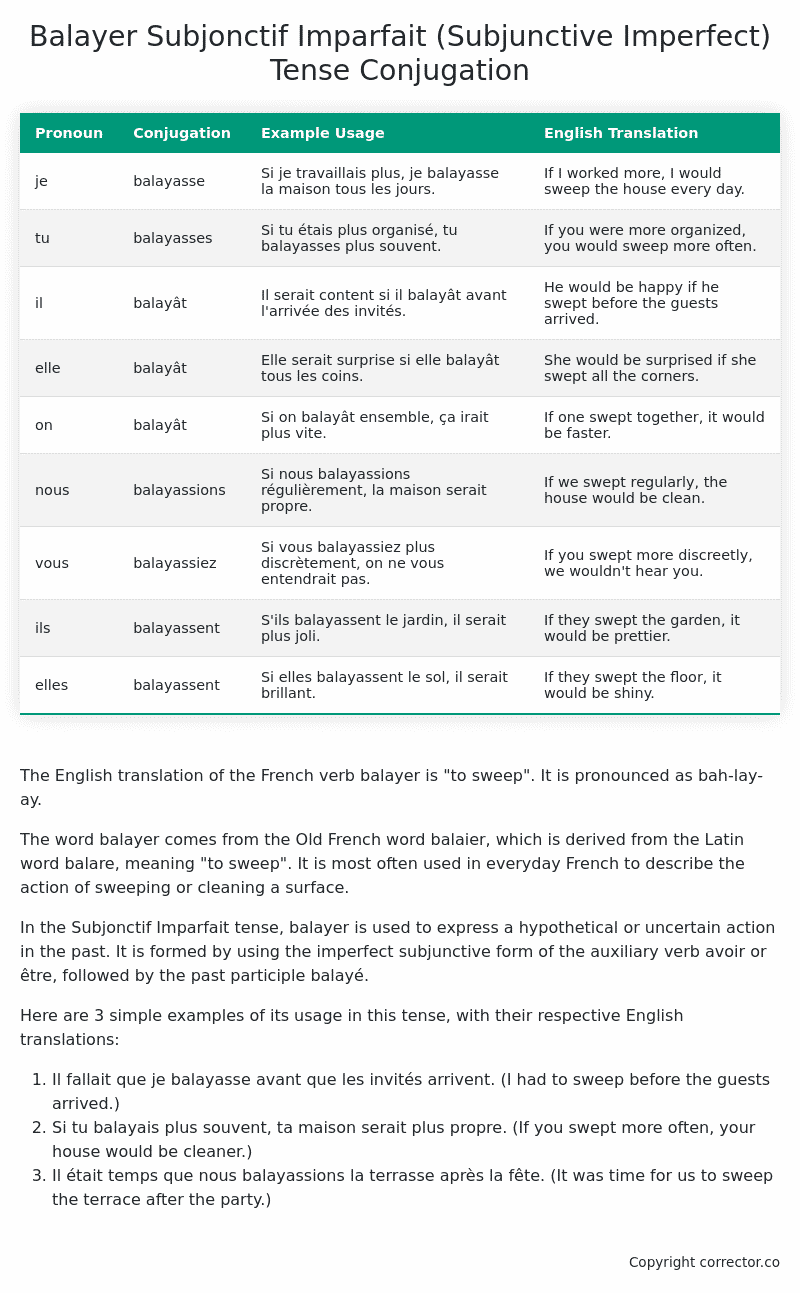Subjonctif Imparfait (Subjunctive Imperfect) Tense Conjugation of the French Verb balayer
Introduction to the verb balayer
The English translation of the French verb balayer is “to sweep”. It is pronounced as bah-lay-ay.
The word balayer comes from the Old French word balaier, which is derived from the Latin word balare, meaning “to sweep”. It is most often used in everyday French to describe the action of sweeping or cleaning a surface.
In the Subjonctif Imparfait tense, balayer is used to express a hypothetical or uncertain action in the past. It is formed by using the imperfect subjunctive form of the auxiliary verb avoir or être, followed by the past participle balayé.
Here are 3 simple examples of its usage in this tense, with their respective English translations:
- Il fallait que je balayasse avant que les invités arrivent. (I had to sweep before the guests arrived.)
- Si tu balayais plus souvent, ta maison serait plus propre. (If you swept more often, your house would be cleaner.)
- Il était temps que nous balayassions la terrasse après la fête. (It was time for us to sweep the terrace after the party.)
Table of the Subjonctif Imparfait (Subjunctive Imperfect) Tense Conjugation of balayer
| Pronoun | Conjugation | Example Usage | English Translation |
|---|---|---|---|
| je | balayasse | Si je travaillais plus, je balayasse la maison tous les jours. | If I worked more, I would sweep the house every day. |
| tu | balayasses | Si tu étais plus organisé, tu balayasses plus souvent. | If you were more organized, you would sweep more often. |
| il | balayât | Il serait content si il balayât avant l’arrivée des invités. | He would be happy if he swept before the guests arrived. |
| elle | balayât | Elle serait surprise si elle balayât tous les coins. | She would be surprised if she swept all the corners. |
| on | balayât | Si on balayât ensemble, ça irait plus vite. | If one swept together, it would be faster. |
| nous | balayassions | Si nous balayassions régulièrement, la maison serait propre. | If we swept regularly, the house would be clean. |
| vous | balayassiez | Si vous balayassiez plus discrètement, on ne vous entendrait pas. | If you swept more discreetly, we wouldn’t hear you. |
| ils | balayassent | S’ils balayassent le jardin, il serait plus joli. | If they swept the garden, it would be prettier. |
| elles | balayassent | Si elles balayassent le sol, il serait brillant. | If they swept the floor, it would be shiny. |
Other Conjugations for Balayer.
Le Present (Present Tense) Conjugation of the French Verb balayer
Imparfait (Imperfect) Tense Conjugation of the French Verb balayer
Passé Simple (Simple Past) Tense Conjugation of the French Verb balayer
Passé Composé (Present Perfect) Tense Conjugation of the French Verb balayer
Futur Simple (Simple Future) Tense Conjugation of the French Verb balayer
Futur Proche (Near Future) Tense Conjugation of the French Verb balayer
Plus-que-parfait (Pluperfect) Tense Conjugation of the French Verb balayer
Passé Antérieur (Past Anterior) Tense Conjugation of the French Verb balayer
Futur Antérieur (Future Anterior) Tense Conjugation of the French Verb balayer
Subjonctif Présent (Subjunctive Present) Tense Conjugation of the French Verb balayer
Subjonctif Passé (Subjunctive Past) Tense Conjugation of the French Verb balayer
Subjonctif Imparfait (Subjunctive Imperfect) Tense Conjugation of the French Verb balayer (this article)
Subjonctif Plus-que-parfait (Subjunctive Pluperfect) Tense Conjugation of the French Verb balayer
Conditionnel Présent (Conditional Present) Tense Conjugation of the French Verb balayer
Conditionnel Passé (Conditional Past) Tense Conjugation of the French Verb balayer
L’impératif Présent (Imperative Present) Tense Conjugation of the French Verb balayer
L’infinitif Présent (Infinitive Present) Tense Conjugation of the French Verb balayer
Struggling with French verbs or the language in general? Why not use our free French Grammar Checker – no registration required!
Get a FREE Download Study Sheet of this Conjugation 🔥
Simply right click the image below, click “save image” and get your free reference for the balayer Subjonctif Imparfait tense conjugation!

Balayer – About the French Subjonctif Imparfait (Subjunctive Imperfect) Tense
Formation
Common Everyday Usage Patterns
Interactions with Other Tenses
Subjonctif Présent
Indicatif Passé Composé
Conditional
Conditional Perfect
Summary
I hope you enjoyed this article on the verb balayer. Still in a learning mood? Check out another TOTALLY random French verb conjugation!


